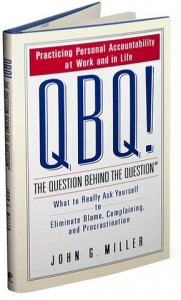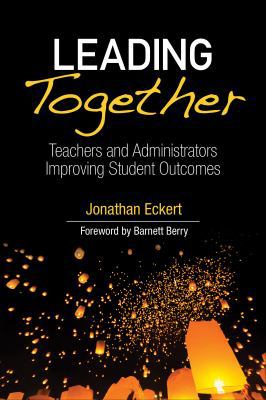This past week, a good friend recommended QBQ! The Question Behind the Question by John G. Miller as a great resource for teams that want to grow. I downloaded this to the Kindle app on my iPad and read the whole thing in about two hours. If you asked me to summarize this book in two works, it would be…personal accountability. The whole premise of the book is to stop the blame game and start recognizing those areas where you have an opportunity to positively impact the outcome of a situation. Rather than directing statements at “you”, it becomes more of an assessment of what can “I” do to help, serve, fix, improve, etc. This was a good book, not a lot of earthshattering ideas, but definitely a great reminder of personal responsibility and the need to make sure that your team is clear on what that looks like for your organization.
Here are some things I highlighted while reading…
- What has happened to personal responsibility? Why does it seem the only thing people know how to do anymore is point the finger elsewhere, blaming something or someone else for their problems, their actions, their feelings?
- Turning our thinking around and asking more personally accountable questions is one of the most powerful and effective things we can do to improve our organizations and our lives.
- This, in a nutshell, is the essence of the QBQ: Making better choices in the moment by asking better questions.
- Make better choices.
- The Question Behind the Question is built on the observation that our first reactions are often negative, bringing to mind Incorrect Questions (IQs).
- But if in each moment of decision we can instead discipline our thoughts to look behind those initial questions and ask better ones (QBQs), the questions themselves will lead us to better results.
- Begin with “What” or “How” (not “Why,” “When,” or “Who”). Contain an “I” (not “they,” “them,” “we,” or “you”). Focus on action.
- The best thing we can do to get rid of victim thinking in our world is to get rid of it in ourselves.
- Different people have different reactions to the same situation. Stress is a choice.
- Stress is also the result of our choices.
- Are you facing change? Any engines quit in your life lately? If so, ask a better question. Here’s one that really works: “How can I adapt to the changing world?”
- “What’s the critical issue facing your organization today?”
- Remember: The answers are in the questions.
- Let’s take care of the little things while they’re still little.
- “When are we going to hear something new?” is the wrong question. The right one is “How can I apply what I’m hearing?”—even if I’ve heard it before.
- Blame and “whodunit” questions solve nothing. They create fear, destroy creativity, and build walls. Instead of brainstorming and working together to get things done, we blame- storm and accomplish nothing. There’s not a chance we’ll reach our full potential until we stop blaming each other and start practicing personal accountability.
- Whom do accountable people blame? No one. Not even themselves.
- With competitors working to beat us every day, can we really afford to be working against each other, too? Let’s climb out of our silos, forget the “we/they,” and remember: We’re all on the same team.
- It’s not about “us” versus “them” or “Why did they overbook the plane?” or “Who dropped the ball?” The better question is “What can I do right now to make a difference?”
- Ownership: “A commitment of the head, heart, and hands to fix the problem and never again affix the blame.”
- Personal accountability does NOT begin with you. It begins with me.
- How much better things would be if we all tried to mold and shape our own thoughts and actions rather than those of others. The bottom line is that the QBQ works because it’s based on the truth “I can only change me.”
- The definition of integrity is this: “Being what I say I am by acting in accordance with my words.”
- Believe or leave.
- “God grant me the serenity to accept the people I cannot change, the courage to change the one I can, and the wisdom to know. . . it’s me!”
- Modeling is the most powerful of all teachers.
- Who’s watching you?
- The practice of personal accountability: We discipline our thoughts. We ask better questions. We take action.
- Leadership, more than anything else, is about the way we think. It’s a moment-to-moment disciplining of our thoughts. It’s about practicing personal accountability and choosing to make a positive contribution, no matter what our role or “level.”
- Humility is the cornerstone of leadership.
- “Leaders are not problem solvers but problem givers.” They let others tackle the problem, design their own solutions, and take action. How else can people learn? How else can leaders serve?
- Learning is really about translating knowing what to do into doing what we know. It’s about changing.


